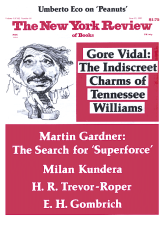Nothing in the minutes before New York at last lit up its Vietnam memorial last month can ever entrap the memory so lastingly and so painfully as the company of soldiers a decade or more demobilized still wearing their jungle fatigues. Their dress was a badge of how different from the rest of us they remain—they insist on looking as though still on the way back from some long patrol carrying their wounded.
Some of them interrupted the pieties from the loudspeaker with hoarse cries defying interpretation. It could not be said whether they were calling out to one another in a language incomprehensible to anyone except themselves or merely raging at all the comfortable strangers who could never know what they know.
There fell upon the spirit the melancholy conviction that to raise up Vietnam memorials is our bounden duty but that whenever we turn the searchlight on one, we illuminate a scar. These unhealed survivors have become the image of the Vietnam veteran for a popular imagination habituated to identifying the type from presumed exemplars by no means typical.
Most of those who served in Vietnam came back to swallow their bad luck and set themselves to the denial of reality that is the prime responsibility for endurance of civilizations as advanced as ours. Denying reality is so much the requisite formula for making one’s way that one ought to cherish these members of the unappeased as much for their refusal to forget what they had to pay as for the payment itself.
The Senate Republicans have lately been struggling with the embarrassment of successive displays of their president’s taste in disposing of offices of trust. One adviser to the secretary of education had to bow out when it was discovered that she had once blamed the handicapped for their own troubles, because “a person’s external circumstances do fit his level of inner spiritual development.”
The new chairman of the Copyright Royalty Tribunal had already been confirmed before she turned out to have been listed as coauthor of a work declaring that most black Americans “insist on preserving their jungle freedoms, their women, their avoidance of personal responsibility.”
Aside from their malignity, these statements shock the sensibilities most for their ignorance. No one who ever watched the heroic struggles of a handicapped child could think him deficient in “inner spiritual development,” and no one remotely familiar with the run of the black community would describe it in terms applicable to no element in our society except possibly the Pentagon. And yet their authors were rewarded with a rise in the world that has made refusal to face the facts of life the great test for getting ahead in it. The bawls that occasionally intruded upon the present ceremony, trial though they were to its sponsors, had at last asserted a reality rebelling against silence.
The mayor lit the memorial, and a visitor moved among the letters to home incised in its glass walls with those uneasy ghosts in their jungle fatigues all around him. The letters echoed other soldiers in other wars, fed up, fagged out, and far from home. There were a few notes evoking remembered comradeship: Charles Dawson, a First Cavalry medic, telling Richard Carlson’s mother how her son had died because, when wounded himself, he persisted in drawing fire while he bound up others of the fallen. “I often wonder,” Corporal Dawson concluded, “if what we are fighting for is worth one human life.”
In Richard Carlson’s case, the cause may very well have been worth a life, but the wall was otherwise stingy with consolations. The uneasy ghosts examined the wall more fixedly than they looked at the fireworks, and so did their fellow visitor, who is generally an addict of these cascades in the skies. Fireworks are for celebrations; and try though we may to salute it, the Vietnam War is only for mourning.
This Issue
June 13, 1985



